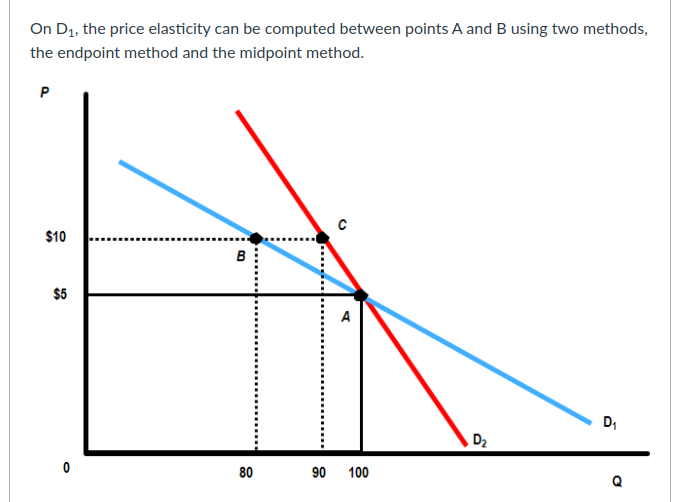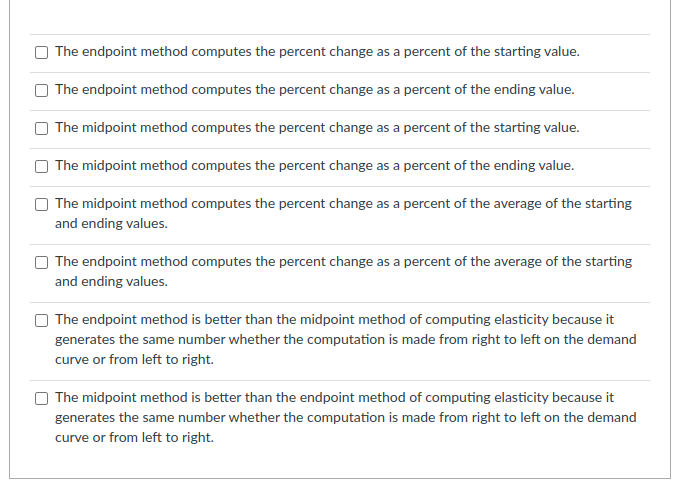The endpoint method computes the percent change as a percent of the starting value. The endpoint method computes the percent change as a percent of the ending value. The midpoint method computes the percent change as a percent of the starting value. The midpoint method computes the percent change as a percent of the ending value. The midpoint method computes the percent change as a percent of the average of the starting and ending values. The endpoint method computes the percent change as a percent of the average of the starting and ending values. The endpoint method is better than the midpoint method of computing elasticity because it generates the same number whether the computation is made from right to left on the demand curve or from left to right. The midpoint method is better than the endpoint method of computing elasticity because it generates the same number whether the computation is made from right to left on the demand curve or from left to right.
The endpoint method computes the percent change as a percent of the starting value. The endpoint method computes the percent change as a percent of the ending value. The midpoint method computes the percent change as a percent of the starting value. The midpoint method computes the percent change as a percent of the ending value. The midpoint method computes the percent change as a percent of the average of the starting and ending values. The endpoint method computes the percent change as a percent of the average of the starting and ending values. The endpoint method is better than the midpoint method of computing elasticity because it generates the same number whether the computation is made from right to left on the demand curve or from left to right. The midpoint method is better than the endpoint method of computing elasticity because it generates the same number whether the computation is made from right to left on the demand curve or from left to right.
Chapter20: Elasticity: Demand And Supply
Section: Chapter Questions
Problem 11E: The price elasticity of the demand for gasoline is -0.02. The price elasticity of demand for...
Related questions
Question
100%
Multiple answers may be correct? look at the images below.

Transcribed Image Text:On D1, the price elasticity can be computed between points A and B using two methods,
the endpoint method and the midpoint method.
P
$10
в
$5
A
D,
D2
80
90
100
Q

Transcribed Image Text:The endpoint method computes the percent change as a percent of the starting value.
The endpoint method computes the percent change as a percent of the ending value.
The midpoint method computes the percent change as a percent of the starting value.
The midpoint method computes the percent change as a percent of the ending value.
The midpoint method computes the percent change as a percent of the average of the starting
and ending values.
The endpoint method computes the percent change as a percent of the average of the starting
and ending values.
The endpoint method is better than the midpoint method of computing elasticity because it
generates the same number whether the computation is made from right to left on the demand
curve or from left to right.
The midpoint method is better than the endpoint method of computing elasticity because it
generates the same number whether the computation is made from right to left on the demand
curve or from left to right.
Expert Solution
This question has been solved!
Explore an expertly crafted, step-by-step solution for a thorough understanding of key concepts.
This is a popular solution!
Trending now
This is a popular solution!
Step by step
Solved in 3 steps with 2 images

Knowledge Booster
Learn more about
Need a deep-dive on the concept behind this application? Look no further. Learn more about this topic, economics and related others by exploring similar questions and additional content below.Recommended textbooks for you








Essentials of Economics (MindTap Course List)
Economics
ISBN:
9781337091992
Author:
N. Gregory Mankiw
Publisher:
Cengage Learning

Managerial Economics: Applications, Strategies an…
Economics
ISBN:
9781305506381
Author:
James R. McGuigan, R. Charles Moyer, Frederick H.deB. Harris
Publisher:
Cengage Learning